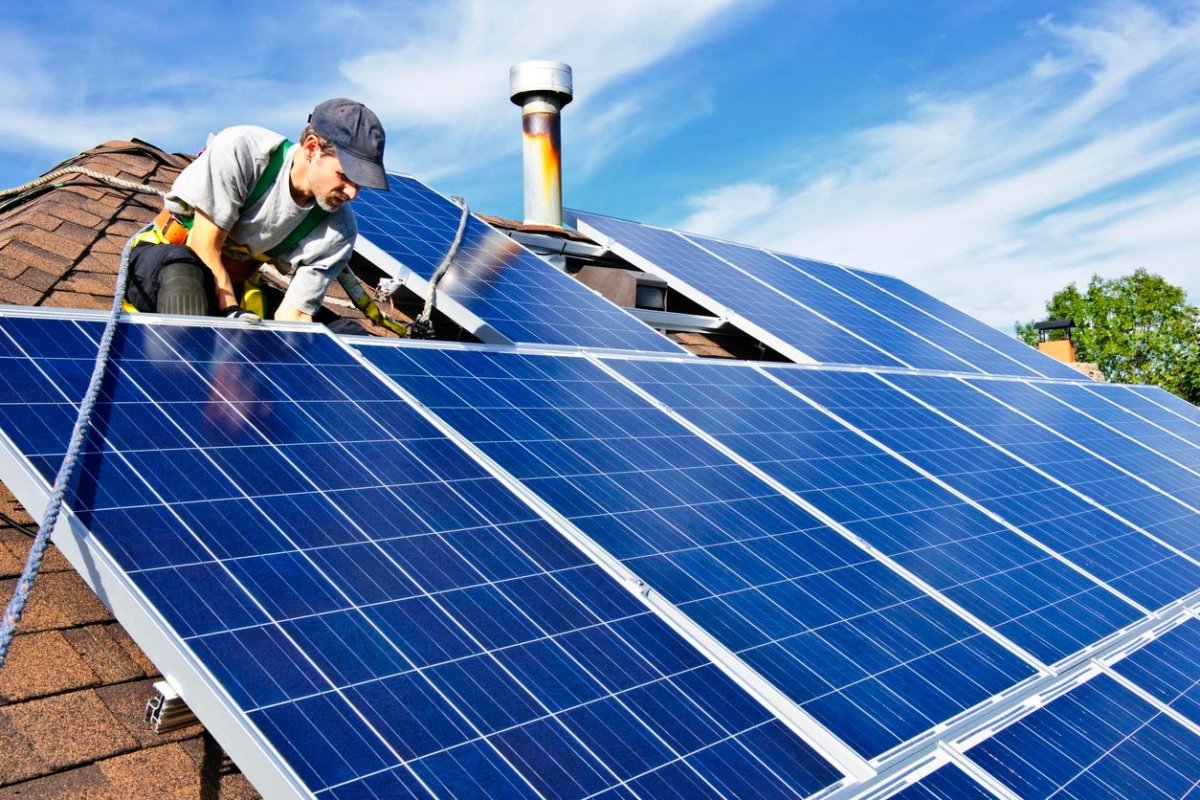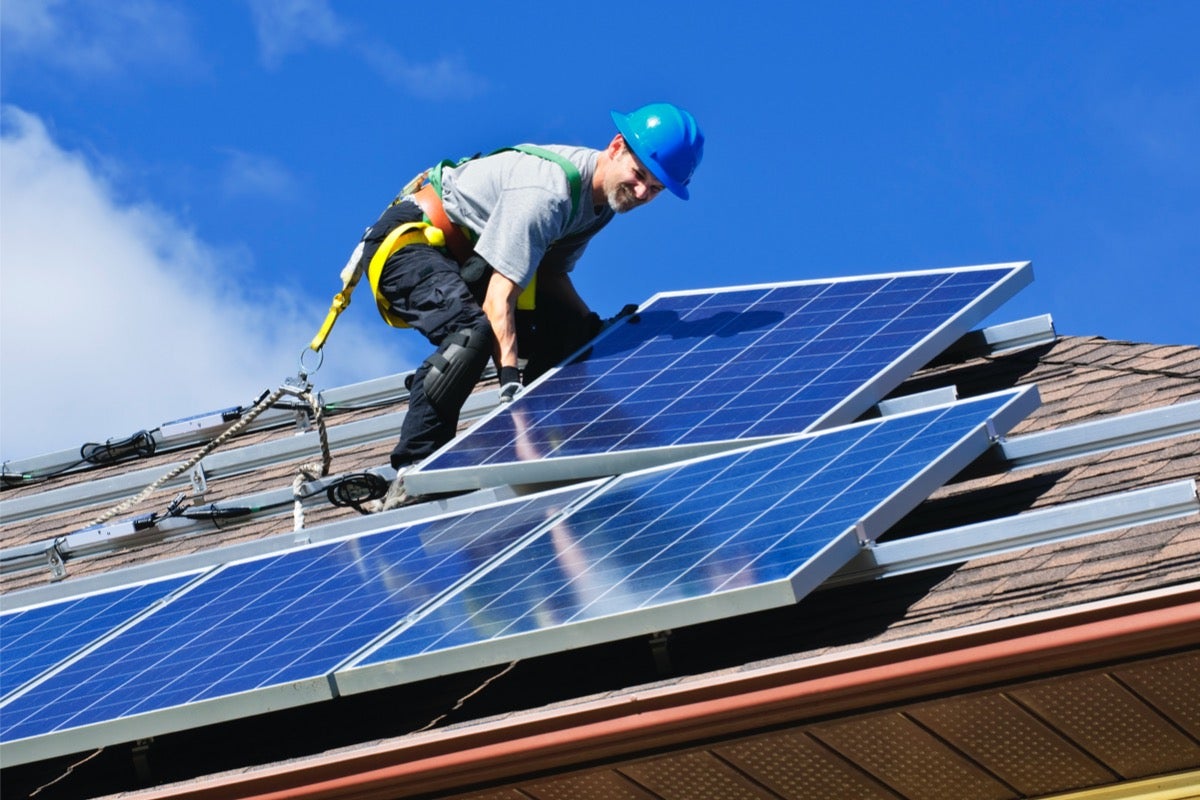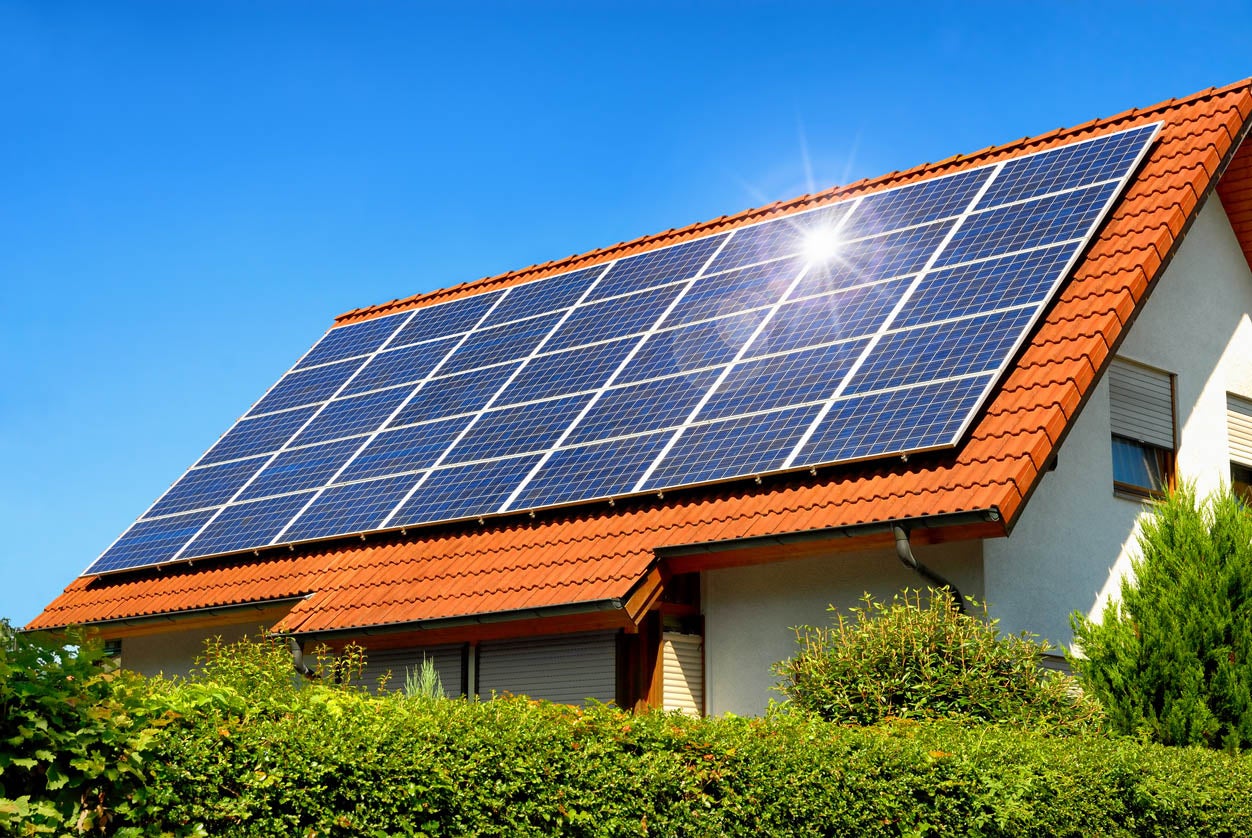

We may earn revenue from the products available on this page and participate in affiliate programs. Learn More ›
Q: I heard that installing solar panels on a house can help save on energy costs. My house receives direct sunlight for most of the day, but I’m not sure if I should take the plunge. Are solar panels worth it?
A: Solar panels, also known as photovoltaic panels, absorb energy from the sun to either partially or fully power a home. The solar panel energy cells convert the energy into DC (direct current) power. After passing through an inverter in the solar panel system, the DC becomes AC (alternate current) power. This converted current will then power anything that’s plugged into a wall outlet. For many homeowners, the cost of installing solar panels is worth the eventual savings. Homeowners can save around $50,000 on electricity costs in 25 years, according to the solar marketplace EnergySage—plus increase the value of their home, receive tax breaks, and reduce their carbon footprint.
Energy produced by solar panels is typically 30 percent cheaper than paying for it via the utility company. The benefits and incentives for using solar energy in a home come from tax credits and rebates, but ultimately, determining whether solar panels are worth it depends on how much you pay for electricity, your rate of energy usage, and how much the installation project will cost. From homeowners to agricultural landowners, many people will benefit from installing solar panels.
Solar panels are worth it for many homeowners, depending on local energy costs, geographic location, roof pitch, and funding method.
Solar panels generally last 25 years or more. For many homeowners, the large up-front investment for a solar panel system installation is worth it for the reduced energy costs and potential tax savings. Factors that homeowners will want to consider before deciding to install solar panels include local energy costs, geographic location, roof pitch, and funding method.
- Local energy costs. Solar panels typically work the best for homes with high electricity bills. Homes that have energy usage in excess of 500 kilowatt hours (kWH) per month are usually excellent candidates for solar panels. If the solar panel system produces excess energy, or more energy than the home uses, homeowners can sell the extra energy output to the local utility company each month. While the sell-back amount will not pay for the price of installation, it is additional money coming in that wasn’t previously.
- Geographic location. One of the most important factors for homeowners to consider when determining whether solar panels are right for their home is to establish how much sun the roof receives. West- and south-facing roofs are the best candidates for solar panels since they get the most amount of sun. Considerations also need to be made for large trees or neighboring buildings that can block the sunlight to the roof. Some areas of the country receive more sunlight than others, and this can affect the overall energy output.
- Roof pitch. The design and angle of the roof are also important factors to take into account when determining whether solar panels are worth it. Solar panels should be installed at an angle between 15 and 40 degrees for the best absorption of sunlight. If the roof has a steeper pitch, then special mounting hardware will need to be used to adjust the angle of the solar panels. This will increase the price of labor and the overall cost of solar panel installation.
- Funding method. A solar panel system can cost between $17,238 and $23,235, with the national average at $20,552 after federal tax credits, based on EnergySage Marketplace quotes. The price will depend on the number of solar panels needed to power a house based on the size of the home. Financing is becoming the most popular way to pay for nonconventional energy sources, including solar power.
Homeowners who live in areas with high energy costs could benefit from lower electric bills by installing solar panels.
Determining how much energy a home consumes and how expensive the electricity bill is can help homeowners make a decision regarding solar panel installation. The average cost for electricity varies from state to state, but it’s typically more expensive in Southern and New England states. Those who live in a region with high electricity rates will find that making a switch to solar power is an excellent investment. If a home doesn’t use a lot of energy throughout the day, the savings may not be enough to offset the expensive up-front installation costs. It’s recommended that homeowners check with their local utility company regarding their net metering program. This buyback program enables homeowners to send the excess energy produced by their solar panel system back to the grid for credit. This amount will be subtracted from the monthly bill, saving money on electricity costs.
You can estimate how much energy you’ll likely generate via rooftop solar panels based on your home’s geographic location, orientation toward the sun, and roof type.
South- and west-facing roofs are the best candidates for solar panel installation since they will receive the greatest amount of sunlight throughout the day. The roof should have an appropriate slope to hold the solar panels (between a 15- and 40-degree angle) to get the most out of the solar panel system. Solar panel efficiency depends on the amount of direct sun—especially during peak energy-use hours. If the solar panels on the roof are blocked by trees or tall buildings, the photovoltaic performance can suffer. Using an irradiance map can help determine how much sunlight a roof receives, and that data can be used by homeowners to discover if it’s worth installing solar panels.
Homes located in states with little to no rain or cloud cover—and without a lot of shade covering the roof—are prime candidates for solar panels.
States such as Arizona, California, Colorado, Florida, Kansas, Nevada, New Mexico, Oklahoma, Texas, and Utah have the most exposure to sunlight in the United States. Areas that experience extreme weather and frequent power outages also benefit from solar panel systems with independent power storage. Homes that are in states that have expensive electricity rates, such as California, Connecticut, Massachusetts, and New York, will benefit more from solar power than those in states that have a cheaper rate for electricity, such as Louisiana, North Carolina, Oregon, and Washington.

The payment method can also influence whether solar panel installation is worth it.
Homeowners have a few options when it comes to paying for a solar panel system for their home: They can take out a loan, lease the panels, or pay in full for the system.
- Loan. Taking out one of the best solar panel loans is typically done through a solar company or a third party. Solar loans are usually 5- or 10-year loans and at the end of the term, the homeowner will own the solar panel system. For some, spreading out payments over time is the best option.
- Lease. For a fixed monthly payment, homeowners can rent the solar panel system. Depending on the lease terms, the rental period can last from 10 to 25 years. At the conclusion of the rental period, the homeowner usually has the option to pay the remaining balance to own the solar panels or they can return the panels to the rental company. These types of power purchase agreements (PPAs) typically require no money down, but they can have expensive cancellation fees and homeowners may experience complications when trying to sell their home.
- Pay in full. Homeowners who have enough money to pay for the solar panel system in full will save more on their purchase than with any other option.
Federal and state tax incentives could help dramatically decrease the cost of installing solar panels.
Tax breaks, incentives, and rebates are all motivating factors when installing a solar panel system. These can significantly reduce the cost of solar panels and lead to long-term savings. Many utility companies offer rebates when homeowners move to solar power, and local and state governments also offer credits for homeowners who change to solar power. Only about 10 states offer tax credits to install a solar panel system, and some provide a sales tax exemption off the purchase price. These types of benefits vary from state to state, so it’s recommended that homeowners research what types of incentives are offered in their state.
Every state in the country qualifies for the Investment Tax Credit (ITC), which is offered to homeowners who install solar panels or solar shingles on their home. This federal tax credit allows for a 30 percent reduction of the cost to install the system through the year 2032. The tax credit rate reduces to 26 percent in 2033 and down to 22 percent in 2034. The ITC is currently scheduled to expire in 2035. This tax credit can help homeowners decrease the cost to install solar shingles or solar panels on their home.
Installing solar panels can increase a home’s value, which could be beneficial when a homeowner decides to sell.
Installing an asset like a solar panel system can increase the value of a home—some buyers may be looking to buy a house with solar panels, and others may see the system as an extra perk. The value typically depends on the size, age, and quality of the system. The increase in a home’s value only happens if the solar panels are owned and not leased. Some states offer a property tax exemption to install solar panels, so homeowners will not have to pay the increased taxes that result from the boost in value.

The environmental impact of solar panel installation can also make this project worth it for homeowners looking to reduce their carbon footprint.
One of the main advantages of solar energy is the reduced environmental footprint. By switching to a clean renewable energy source like solar power, homeowners will rely less on fossil fuels to power their home. Harnessing the power of the sun to supply energy to homes can help protect the environment while saving money on energy costs. Utilizing solar power allows homeowners to reduce their carbon footprint by lowering harmful emissions that can contribute to climate change.
Do thorough research and get quotes from several solar companies before deciding whether solar is right for you.
It’s recommended that homeowners get quotes from at least three of the best solar installation companies in their area to find a price that works with their budget. A comparison shopping service like EnergySage can organize multiple quotes from local vetted solar installers into a single dashboard view. By comparing quotes, homeowners can find a better installation rate and avoid paying inflated prices.
FAQs
Installing a solar panel system is a big purchase, and homeowners will benefit from having as much information as possible to guide the decision-making process. Below are some frequently asked questions regarding solar energy and solar panel installation.
Yes, solar energy can save money. EnergySage estimates that homeowners can save between $31,000 and $100,000 over the lifetime of the solar panels (or $50,000 over 25 years after installation), depending on where you live and the local cost of electricity.
Some downsides of having solar power include the high up-front costs to install the solar panel system, the maintenance costs, the fact that the system only works when the sun is shining, and the fact that some parts of the system will need to be replaced every few years.
An air-conditioning system can be powered with solar panels. The size of the unit and the overall price of the battery, inverter, and how many panels are needed will influence the overall cost.
Solar panels can last from 25 to 30 years.
To find out how many solar panels are needed to power a home, a homeowner will need to find out the annual energy usage, the solar panel wattage, and the production ratio, then decide on the type of solar panels that they will install. Although high-quality solar panels are more expensive, they’re also more efficient, so fewer of them are needed.
Some homeowners may worry that temperature variation between summer and winter will negatively impact the function of the solar panel system. However, the colder solar cell temperature makes the photovoltaic technology work more efficiently during the winter months.
